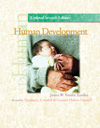 |  Human Development: Updated, 7/e James Vander Zanden,
Ohio State University
Thomas Crandell,
Broome Community College
Corinne Crandell,
Broome Community College
Middle Adulthood: Physical and Cognitive Development
Learning ObjectivesAfter completing Chapter 15, you should be able to:
1Describe the contemporary view of middle age. |
 |  |  | 2Describe several vision-related changes and/or disorders that often are evident in middle age, and cite medical interventions that are available to improve quality of vision. |
 |  |  | 3Explain when hearing changes usually begin to occur, how these changes affect one's daily living, and who is most at risk for hearing loss. |
 |  |  | 4Describe each of the following physical changes of middle age.
changes in skin, teeth, and hair:
muscle atrophy, weight gain, osteoporosis, rheumatoid arthritis:
menopause:
climacteric:
reported psychological consequences of menopause:
|
 |  |  | 5Describe several common male mid-life changes and the treatments which improve the quality of a man's life.
prostate gland:
drop in testosterone and accompanying changes:
circadian rhythm:
impotence:
factors that impact a man's virility on a temporary basis:
male menopause:
|
 |  |  | 6Discuss findings concerning changes in sexual functioning in middle age.
frequency of sexual activity:
frequency of orgasm:
number of sex partners:
faithfulness or extramarital sex:
inability to achieve orgasm:
|
 |  |  | 7Describe several medical conditions that have an impact on sexual functioning as one ages. |
 |  |  | 8Discuss cardiovascular health problems, including risk factors, the course of the disease, and treatments. |
 |  |  | 9Discuss different diseases connected with the brain: stroke, Parkinson's, Alzheimer's. |
 |  |  | 10Discuss several risk factors related to cancer. |
 |  |  | 11Explain the relationship between social support and health. |
 |  |  | 12Explain the terms fluid intelligence and crystallized intelligence. |
 |  |  | 13Discuss the differences between cognition and intelligence.
dialectical thinking:
Schaie's four stages:
convergent:
divergent:
|
 |  |  | 14Discuss the research by Colby and Damon on moral exemplars. |
|



 2003 McGraw-Hill Higher Education
2003 McGraw-Hill Higher Education